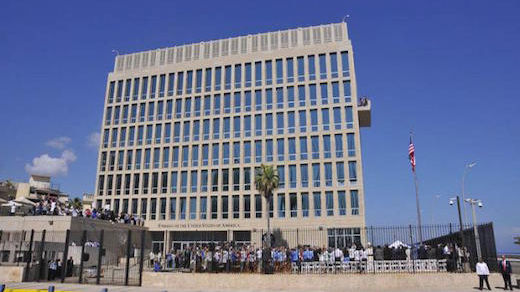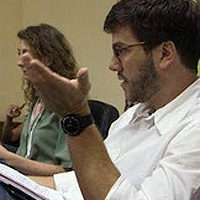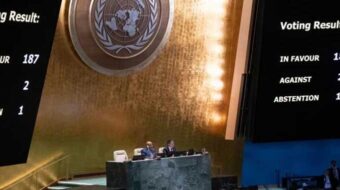
HAVANA (AP) — A jubilant flag-raising at the reopened U.S. Embassy in Havana is giving way to serious talk about the road ahead in improving relations between the United States and Cuba.
Capping off a Friday in Havana that began with the Stars and Stripes being hoisted outside the embassy, Secretary of State John Kerry met with Cuban dissidents in the evening and said the island will not see an end to the despised U.S. trade embargo if Cuba’s single-party government does not make progress on human rights.
Cuban and U.S. negotiators are to meet in Havana in early September to begin talks on normalization of the relationship between the two countries, which includes topics ranging from maritime security to the embargo to human rights, Kerry told reporters.
He said negotiations will follow three tracks. The first will encompass areas in which rapid progress is expected, such as cooperation on naval matters, climate change and the environment. The second will tackle more complex topics like the establishment of direct airline flights and U.S. telecommunications deals with Cuba. The last will take on the toughest problems, including the embargo, human rights and each country’s desire to have fugitives returned by the other.
While the three tracks will proceed simultaneously, Kerry said, Cuban leaders should not expect to see progress on the embargo without improvements in civil liberties in Cuba, which does not allow independent media, political parties other than the ruling communist party or direct election of anything but low-level municipal posts.
“There is no way Congress will lift the embargo if we are not making progress on issues of conscience,” he said.
Kerry began the day with a nationally broadcast call for democratic change on the island, saying that “we remain convinced the people of Cuba would be best served by a genuine democracy, where people are free to choose their leaders, express their ideas, practice their faith.”
Addressing reporters with Kerry after the ceremony, Foreign Minister Bruno Rodriguez responded by indignantly opening his remarks with complaints of U.S. human rights transgressions – from police shootings of black men to mistreatment of prisoners at Guantanamo Bay, the U.S. naval base on Cuba that the government says must be returned.
“Cuba isn’t a place where there’s racial discrimination, police brutality or deaths resulting from those problems,” Rodriguez said. “The territory where torture occurs and people are held in legal limbo isn’t under Cuban jurisdiction.”
President Barack Obama also called for change in Cuba when he announced the new U.S. policy of engagement in December, but his words were less pointed than Kerry’s on Friday.
Cuba formally reopened its Washington embassy last month. The U.S. raised its flag in Havana then, too, though saving the formal ceremony for Kerry’s visit. Three Marines who took part in lowering the U.S. flag when the embassy was closed in 1961 handed over the new flag to Marines who raised it on Friday.
Kerry was the first secretary of state to visit Cuba since 1945, and his speech was remarkable for its bluntness and the national spotlight in which it came.
The flag raising ceremony at he U.S. embassy constitutes the official opening of the diplomatic mission, which has been functioning as an embassy since July 20.
Special participants were James Tracy, Mike East and Larry Morris, the three Marines who lowered the flag in 1961, and this morning carried the U.S. flag raised in front of the building located on Havana’s emblematic waterfront.
Embassy Charge d’affaires Jeffrey DeLaurentis welcomed the U.S. delegation, as well as the Cuban, led by Josefina Vidal, the Foreign Ministry’s director for the United States, commenting that the day marked a new beginning in the two countries’ relationship.
Hundreds of people within the grounds and surrounding the area witnessed what has been described as a historic event, joined by reporters and photographers assigned to cover the proceedings by media around the world.
The Cuban American poet Richard Blanco recited his poem “Matters of the sea-Cosas de mar,” followed by Kerry’s remarks.
The formal opening of the embassy and Kerry’s visit to Cuba concludes the first phase of efforts underway to normalize relations, announced Dec. 17, 2014, by Presidents Raúl Castro and Obama.
Associated Press writers Anne-Marie Garcia and Andrea Rodriguez and the Cuban website, Granma, contributed to this report.
Photo: Juvenal Balán (Granma)













Comments